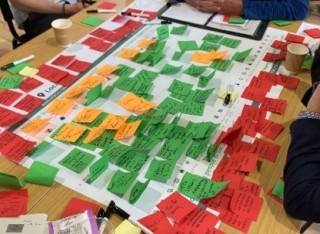
Professor Angela Druckman
Academic and research departments
Centre for Environment and Sustainability, School of Sustainability, Civil and Environmental Engineering.About
Biography
Angela Druckman is Emerita Professor of Sustainable Consumption and Production at the University of Surrey, having been awarded Emerita status in September 2022 in recognition of the contribution she made to advancing sustainability at the University. Angela was Director of the Centre for Environment & Sustainability (CES) 2020-2022.
In addition to still undertaking research and teaching for the University, Angela is Director of Surrey Climate Commission, on the Advisory Board for North Star Transition, and is carrying out consultancy for with Circular Communities Scotland . Angela is also co-investigator for major academic projects, including: Centre for the Understanding of Sustainable Prosperity (CUSP); Advocacy for Climate Change and Environment Social Science (ACCESS); and WISE HORIZONS: Wellbeing, Inclusion, Sustainability and the Economy.
Angela’s multidisciplinary research focuses on investigating avenues to more sustainable lifestyles, taking a holistic, systems-based approach that encompasses supply chain analysis combined with understandings of individual and societal behaviours.
Angela’s publications can be accessed via Google Scholar.
Angela read Engineering at the University of Cambridge, and is a Chartered Engineer.
News
Publications
Modern economies rely on economic growth for stability and prosperity. Further, periods of stagnation and recession are currently associated with poor health and wellbeing outcomes for citizens. However, 50 years of research indicates that this state of dependency is ecologically unsustainable. It is therefore critical that we better understand the growth dependency of our economies and welfare systems, and how to overcome it. In this paper we first offer a working definition of growth dependency, clarifying its core dimensions. Next, taking the UK's adult social care sector as a case study, we argue that growth dependencies emerge in the welfare state as a result of three distinct dynamics: 1) growth in manifest needs; 2) labour productivity growth; 3) the pursuit of economic rents. Lastly, we propose a novel, sector-led framework for identifying, analysing and transforming growth dependencies. We make the case that the growth dependency of the welfare state is not inevitable, but is instead the product of specific social, economic and structural factors that can be disrupted and transformed, if we can find the political will to do so.
Purpose – This viewpoint paper addresses the use of sustainability frameworks in embedding education for sustainability into the curriculum of higher education institutions (HEIs). The purpose of this paper is to explore the paradox that sustainability frameworks must facilitate transformation of existing structures whilst also being well-enough aligned with current conditions to be readily adopted by today’s HEIs.
Design/methodology/approach – This paper proposes a set of four criteria for assessing the suitability of sustainability frameworks for use across the curriculum: relevance to current curricula, language, institutional fit and concept of the future. Using these criteria, this paper assesses how various frameworks align with the current (unsustainable) state of affairs and their transformative potential. The frameworks assessed are: the sustainable development goals (SDGs), the three pillars framework and the capitals approach.
Findings – This paper finds that each of the frameworks has strengths and weaknesses: the SDGs and the capitals approach perform well on alignment but less well on transformational criteria. Conversely, the three pillars framework performs well on transformation criteria but less well on alignment criteria. By applying the criteria set out in this paper, the authors hope those working to embed sustainability into the curricula of HEIs will be better equipped to navigate the tensions presented by sustainability transitions.



